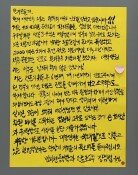Note-taking and survival in Korean society
Note-taking and survival in Korean society
Posted January. 31, 2017 07:01,
Updated January. 31, 2017 07:10
Three years ago, a book titled “Who gets A+ in Seoul National University” was published in South Korea, drawing much heated public attention. The book covers in-depth interviews and survey findings to explore the thesis that “Being good at dictation tests is a prerequisite for getting good grades,” something of an empirical knowledge rampant in Korean society. As much as 87 percent of the top-notch students interviewed by the author, Lee Hye-jeong, a former researcher at the Development Center for Teaching and Learning of SNU, responded that they “try to write down the professor’s every word in class,” and that they apply the information verbatim for tests and reports.
Let’s take look at the prestigious colleges in other countries. In 2015, Korean educational broadcaster EBS aired a documentary titled “The Test” to survey the students from Michigan State University, which produced a number of Nobel Prize winners, and found out that there was little correlation between notes-taking and academic performance. If anything, I still remember the interview of a student who said, “Taking notes stops you from thinking. I make it a rule to write down the ideas popping in my head instead of what I am hearing.” SNU is also planning to bring change to its long-standing teaching method of dictation, starting in the first semester this year. And in some courses of liber arts, the university plans to adopt a “Pass or Fail” system instead of conferring grades.
The shadow of dictation looms beyond the boundaries of classroom in South Korea. Executive officers write down CEO’s instructions, and directors stenograph the words of ministers. Park Geun-hye and her presidential office were at the pinnacle of the hierarchy. TV news programs often catch ministers and secretaries trying to write down every single word from her mouth in Cabinet and chief secretaries’ meetings. Ahn Jong-beom, former presidential secretary for policy coordination who has been arrested, must have been her pet student. He recorded the instructions from President Park word-to-word for two years, using a cell phone dedicated to communicating with the president who did not like face-to-face meetings, and the amount of records runs 510 pages in 17 notebooks.
According to Ahn, the president had the habit of asking if he was “writing down” while giving out directions. It is likely that even the concept of “Creative Economy,” the crowning achievement of the Park administration, may have been an outgrowth of “dictations” from its conception to executions. We are living in a society where jotting down what your teachers and bosses have to say is considered as a core competence of elites and a prerequisite of success. It is doubtful if we will be able to achieve the educational innovation to nurture creative talents that we desperately need to survive the Fourth Industrial Revolution.
Headline News
- Med professors announce intention to leave hospitals starting Thursday
- Bridge honoring Sgt. Moon Jae-sik unveiled in Pennsylvania
- Chief of Staff Chung tells presidential secretaries to stay away from politics
- US FTC bans noncompete agreements
- N. Korea launches cyberattacks on S. Korea's defense companies







